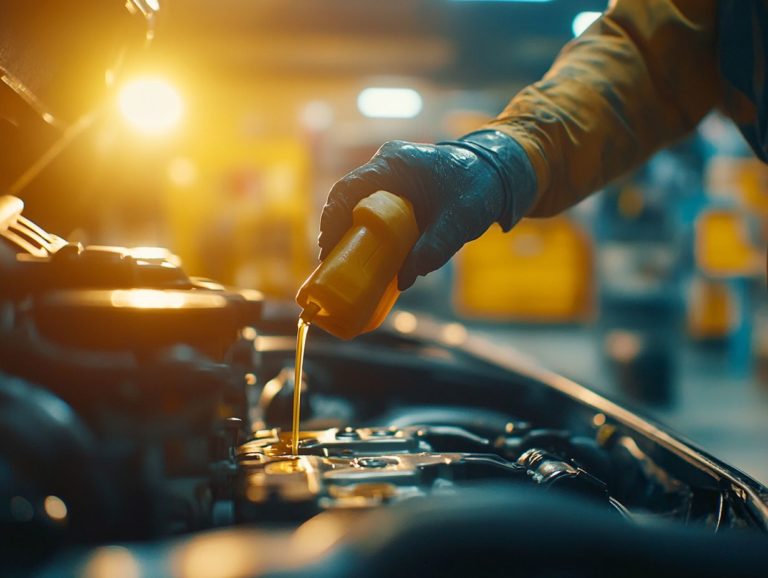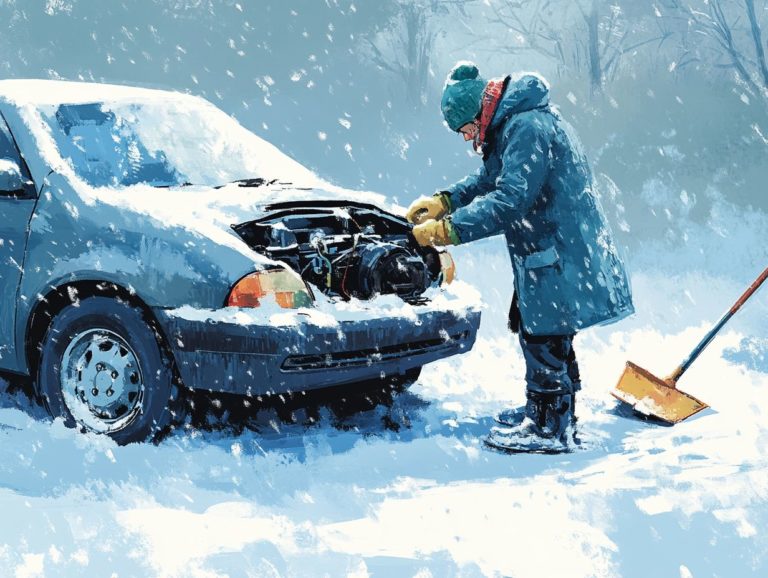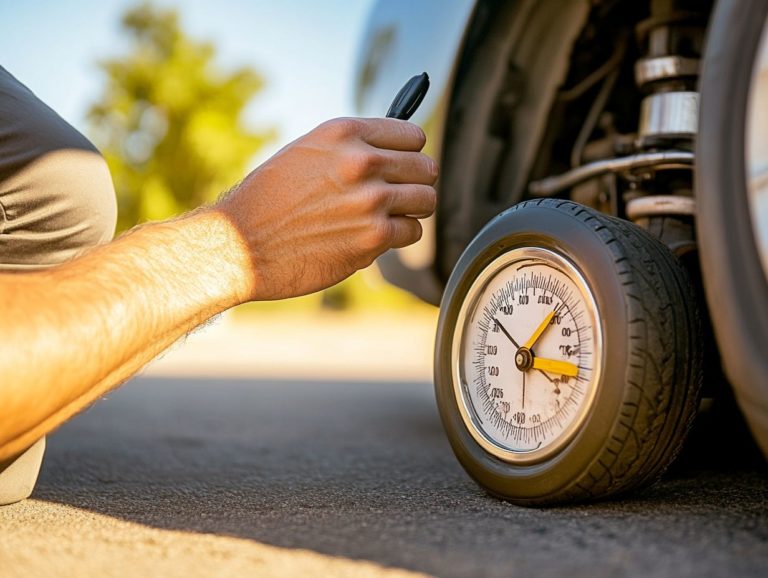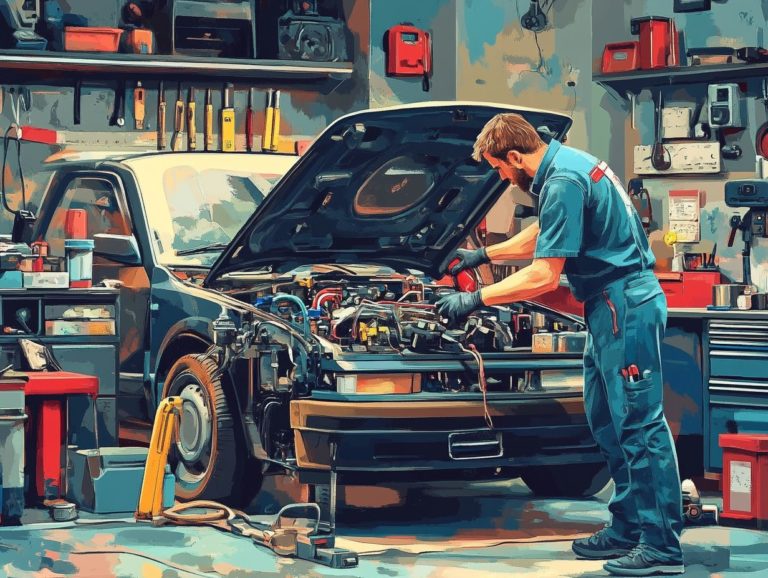5 Signs Your Car Needs a Tune-Up
Is your car not performing at its peak? Whether it struggles to start, shows decreased fuel efficiency, or has warning lights illuminating your dashboard, these symptoms may indicate that your vehicle is in dire need of a tune-up.
This article delves into the crucial signs that suggest your car requires attention and outlines what a tune-up entails. You ll discover how often you should schedule one, the advantages of regular maintenance, and whether you re equipped to handle it on your own.
Continue reading to ensure your car remains in prime condition!
Contents
- Key Takeaways:
- 1. Difficulty Starting the Car
- 2. Decreased Fuel Efficiency
- 3. Engine Misfires or Stalling
- 4. Unusual Noises or Vibrations
- 5. Warning Lights on the Dashboard
- What Is a Car Tune-Up and Why Is It Important?
- How Often Should a Car Get a Tune-Up?
- What Are the Benefits of Regular Tune-Ups?
- Can a Car Owner Perform a Tune-Up Themselves?
- What Are the Signs of a Bad Tune-Up?
- Frequently Asked Questions
Key Takeaways:
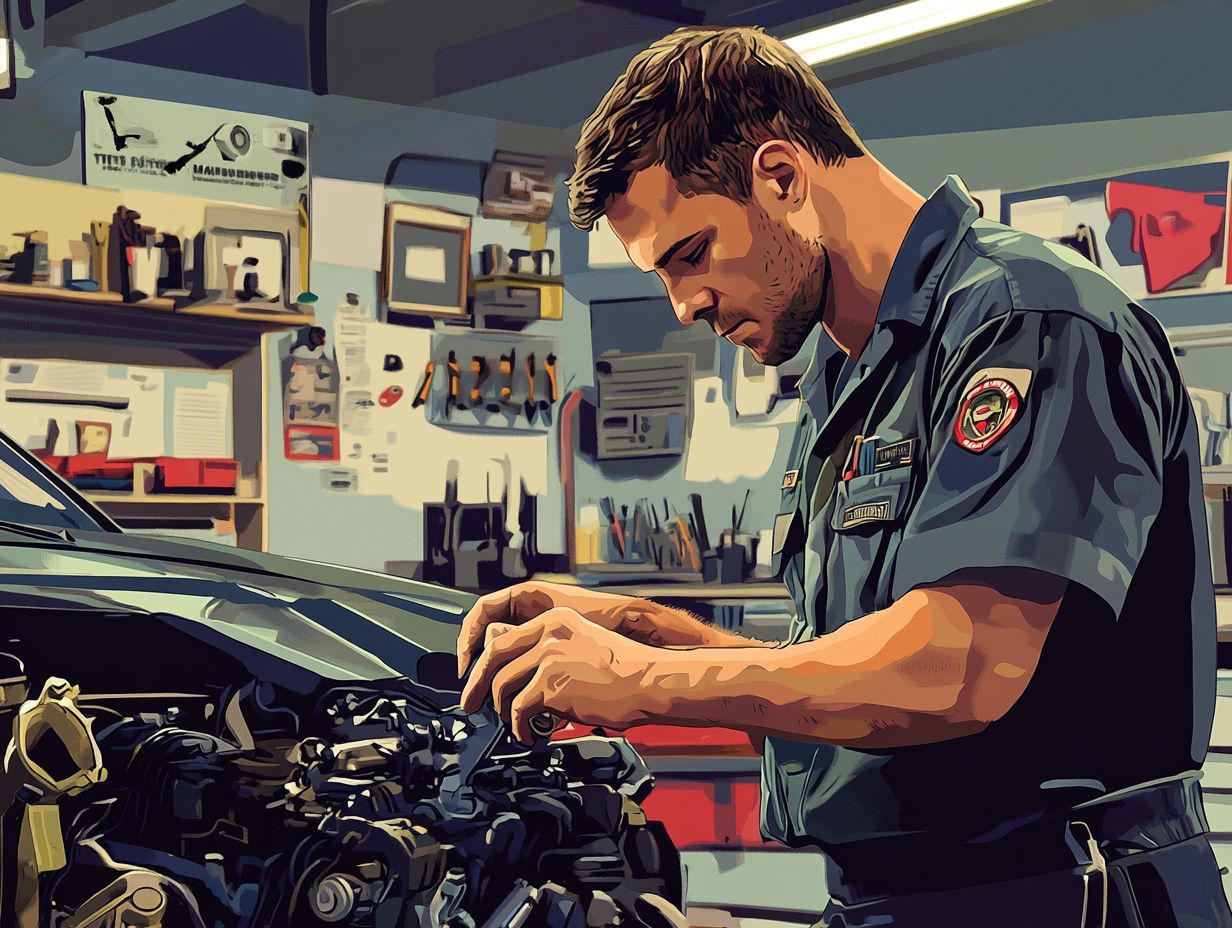
- 1. Difficulty starting your car could be a sign of a needed tune-up, especially if the battery and starter have been ruled out.
- 2. Decreased fuel efficiency can be a result of dirty spark plugs or a clogged air filter, both of which can be addressed during a tune-up.
- 3. Engine misfires or stalling can be caused by worn-out spark plugs or a faulty fuel injector, both of which can be detected during a tune-up.
1. Difficulty Starting the Car
Experiencing difficulty starting your car can be a deeply frustrating issue. It can signal potential problems within critical systems like the ignition, battery, or fuel delivery.
Ignoring these issues can lead to serious performance and safety risks. For instance, a failing battery may present itself through slow cranking or dimming headlights. Meanwhile, an ignition system malfunction might create strange noises or prevent the engine from firing at all. If you’re experiencing issues with getting fuel to the engine, you might notice your engine sputtering or hesitating.
Understanding these symptoms is essential for your peace of mind. In Ontario, you can turn to local experts like Gordon Automotive. They provide tailored solutions to ensure your vehicle remains reliable and safe on the road.
2. Decreased Fuel Efficiency
A noticeable drop in fuel efficiency can signal underlying issues, such as a clogged air filter or fuel injector problems. These issues waste your hard-earned money and negatively impact the environment.
Regular car maintenance is crucial for ensuring optimal fuel consumption and prolonging the life of your vehicle. Routine tune-ups can significantly enhance engine performance while nipping minor issues in the bud.
By frequently checking components like spark plugs, tire pressure, and air filters, you can boost your vehicle’s efficiency. If you’re in Ontario or Ottawa, local automotive services provide specialized inspections designed to improve fuel economy.
Adopt driving habits like smooth acceleration and maintaining a steady speed to further improve your mileage. This lets you maximize every drop of fuel.
3. Engine Misfires or Stalling
Engine misfires or stalling can be quite alarming for any car owner. They often hint at issues with components like spark plugs or the ignition system.
Letting these problems linger can lead to hefty repair bills and compromise your safety. By understanding common culprits like worn-out spark plugs, faulty ignition coils, or issues in the exhaust system you can take proactive steps.
Regular maintenance checks help identify these potential glitches before they escalate. They also enhance your vehicle s overall performance and efficiency.
When you promptly address any signs of misfiring or stalling, you re not just protecting your investment; you re ensuring that your vehicle runs smoothly. This way, you can enjoy a safer and more reliable driving experience.
4. Unusual Noises or Vibrations
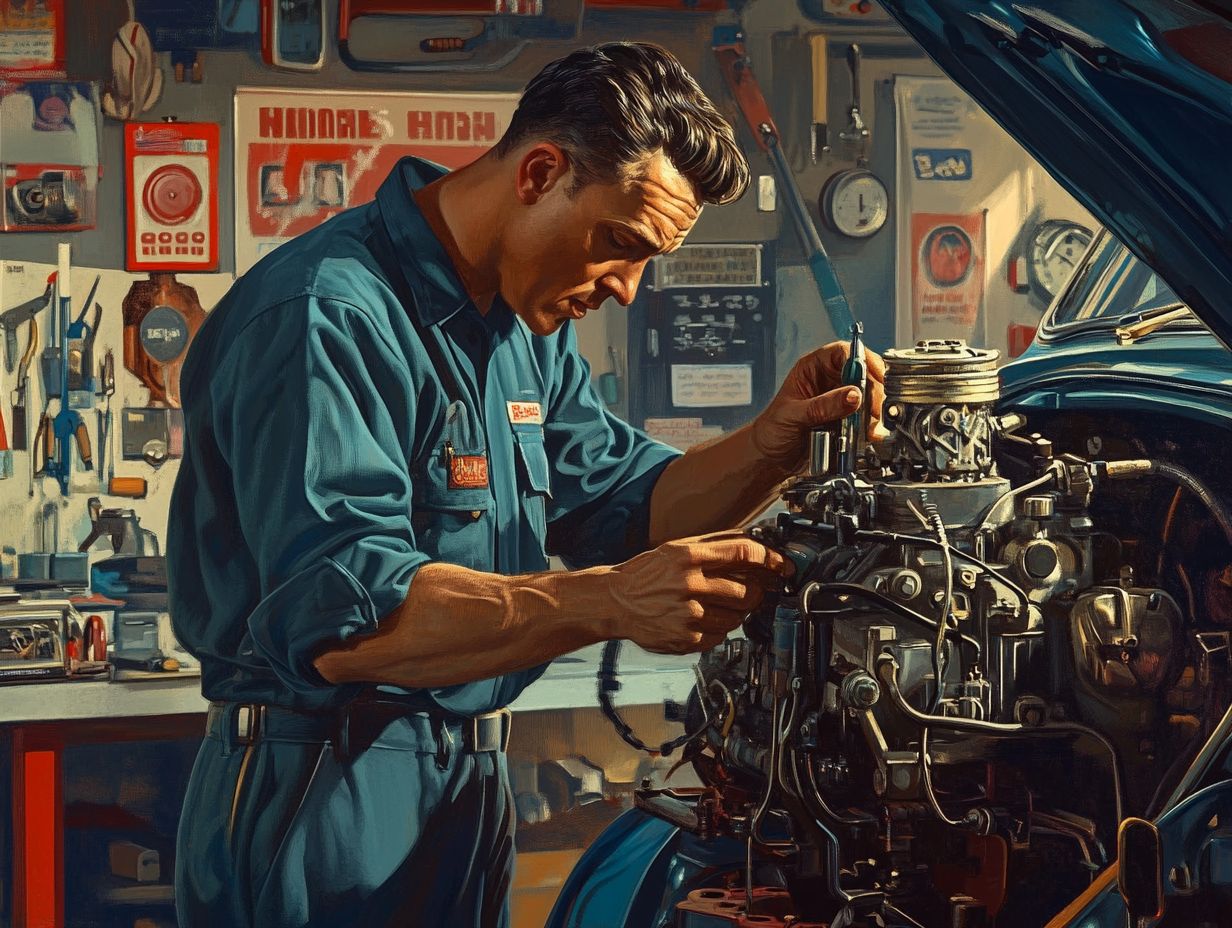
If you re hearing unusual noises or feeling vibrations while driving, it s a sign that critical systems like your brakes or parts that help your car ride smoothly may be failing. Don t wait get a professional mechanic to check it out today!
Different types of noises grinding, squeaking, or clunking can indicate various mechanical issues. For example, a grinding sound might point to worn brake pads that need replacing. A clunking noise could suggest that suspension parts are loose.
If you feel vibrations through the steering wheel or seat, it could signal problems with your tires or an imbalance in the drive shaft. Disregarding these warning signs may lead to more severe problems later on, which could jeopardize your vehicle s safety.
It s wise to consult a professional mechanic when these symptoms arise, as prompt intervention can save you from costly repairs and provide you with peace of mind on the road.
5. Warning Lights on the Dashboard
Ever seen a strange light flicker on your dashboard? Here s what it means! Dashboard warning lights are your vehicle’s vital indicators, offering crucial insights into its health. Signals like the engine light or brake warning light are there to alert you to potential issues.
These illuminated warnings act as your vehicle s communication system, conveying everything from minor maintenance needs to serious malfunctions. For example, a low oil pressure light might hint at a risk of engine damage if overlooked, while the tire pressure warning could signify underinflation.
Responding promptly to these signals is essential; neglecting them can lead to more significant problems down the road. Regular safety inspections not only help you catch these warning signs early but also boost your vehicle s reliability.
By ensuring issues are addressed before they escalate, you can avoid costly repairs or unsafe driving situations.
What Is a Car Tune-Up and Why Is It Important?
A car tune-up serves as an all-encompassing maintenance service designed to optimize your vehicle’s performance. By addressing key components like the ignition system, fuel injectors, and air filter, it enhances fuel efficiency.
During this process, professionals meticulously inspect spark plugs, battery connections, and hoses elements that are vital for smooth operation. Regular tune-ups not only extend the lifespan of your vehicle but also help prevent unexpected breakdowns.
By investing in routine maintenance at reputable local services like Gordon Automotive in Ontario, you can enjoy peace of mind. This blend of thorough inspections and timely repairs significantly enhances safety on the road, minimizing the chances of roadside emergencies.
What Are the Common Components Checked During a Tune-Up?
During a car tune-up, several key components are routinely checked to ensure your vehicle performs at its best. This includes an oil change, spark plugs, air filter, and exhaust system each playing a vital role in your car’s functionality and safety.
- The oil change is crucial for keeping your engine running smoothly by providing necessary lubrication.
- Fresh spark plugs ignite the fuel mixture more efficiently, promoting better fuel economy and reducing emissions.
- The air filter maintains clean airflow into the engine, essential for optimal combustion and overall power.
- A well-maintained exhaust system helps eliminate harmful gases, enhancing your car’s performance.
Regular maintenance, like these tune-ups, is critical. It allows you to identify potential issues early on, saving you from costly repairs and extending the lifespan of your vehicle.
How Often Should a Car Get a Tune-Up?

The frequency of tune-ups can vary significantly based on several factors, including your driving habits, vehicle model, and the recommendations from your manufacturer.
As a general guideline, consider scheduling a tune-up every 30,000 miles or every two years.
If you often navigate through stop-and-go traffic or tackle rough terrain, you might need to schedule tune-ups more frequently. The wear and tear on your vehicle may require it. Older vehicles typically need extra attention, as their components often don t perform as efficiently as those in newer models.
Following the specific guidelines outlined by your manufacturer not only enhances your vehicle s longevity but also ensures it operates at peak performance.
In Ontario, local regulations emphasize the importance of routine maintenance. Drivers are encouraged to stay informed about their vehicle’s health. This diligence helps comply with safety standards and emissions tests, promoting both road safety and environmental responsibility.
What Are the Benefits of Regular Tune-Ups?
Regular tune-ups can transform your driving experience! They offer a wealth of benefits, such as improved fuel efficiency, enhanced engine performance, and increased vehicle longevity. They are an essential aspect of automotive maintenance that you should prioritize.
By investing in routine tune-ups, you not only ensure a smoother driving experience but also significantly reduce the risk of unexpected breakdowns.
According to a study by the American Automobile Association, vehicles that receive regular maintenance can achieve up to 20% better fuel economy. That means more savings at the gas pump for you!
A well-maintained engine can save you from costly repairs later. The Automotive Service Association statistics show that proper maintenance can extend your vehicle s life by up to 10 years. These compelling advantages highlight why making tune-ups a top priority is crucial they are vital for the overall health and safety of your vehicle.
Can a Car Owner Perform a Tune-Up Themselves?
While you might find changing the oil and replacing spark plugs manageable enough as a DIY project, other tasks definitely call for professional expertise. This ensures that all systems perform at their best and, more importantly, safely.
Tasks like replacing air filters and checking fluid levels are typically straightforward and can be accomplished without a deep dive into mechanical intricacies. However, more complex tasks like inspecting the timing belt or diagnosing electrical issues are best left to trained technicians who possess the right tools and experience.
If you opt for DIY maintenance, prioritize safety by using appropriate gear, such as protective gloves and eyewear. It s also wise to consult reliable resources or instructional videos to navigate each task confidently.
A well-executed maintenance approach not only ensures your vehicle runs smoothly but can also prevent costly repairs in the future.
What Are the Signs of a Bad Tune-Up?
Recognizing the signs of a bad tune-up is essential. Symptoms like rough idling, decreased fuel efficiency, and unusual vibrations can indicate that critical components haven’t received the attention they need, so be aware of signs your car needs immediate maintenance.
A poorly executed tune-up can lead to problems, such as misfires, which occur when the engine doesn’t fire correctly, disrupting performance or spark plugs that need replacement. Ignoring these warning signs of common engine problems can escalate into costly repairs later, such as engine overheating or damage to the fuel system.
By addressing these signals promptly, you ensure your vehicle remains reliable and efficient. This protects you from harsh financial repercussions and extends the life of essential parts.
Frequently Asked Questions
Got questions? Here are the most common ones we hear!

What are the signs that my car needs a tune-up?
- Decreased fuel efficiency: Notice a drop in fuel efficiency? Your car may need a tune-up.
- Rough idling: Is your car shaking or vibrating while idling? This could mean parts that ignite the fuel need replacing or adjusting.
- Trouble starting the engine: If your car struggles to start or needs several tries, worn-out spark plugs could be the problem.
- Engine warning light: If your check engine light is on, it indicates various issues, including the need for a tune-up.
- Lack of power or acceleration: Does your car feel sluggish or struggle to accelerate? A dirty air filter or bad spark plugs could be at fault.
How often should I get a tune-up for my car?
You should get a tune-up every 30,000 miles or every 2-3 years, depending on your car’s make, model, and your driving habits.
What is included in a car tune-up?
A car tune-up typically involves replacing or adjusting spark plugs, spark plug wires, distributor cap and rotor, air filter, fuel filter, and PCV valve. Don’t forget! A thorough check of belts, hoses, and fluids is also included!
Can I do a tune-up myself, or should I take it to a mechanic?
While knowledgeable car owners can handle basic tasks like replacing spark plugs, it s best to have a professional mechanic perform the tune-up. This ensures all components are properly inspected and replaced if necessary.
What happens if I don’t get a tune-up?
Neglecting a necessary tune-up can lead to decreased fuel efficiency, engine misfires, starting difficulties, and serious engine problems down the line.
How much does a car tune-up typically cost?
The cost of a tune-up varies based on your car s make, model, and the services performed. On average, expect to pay between $50 and $200.

